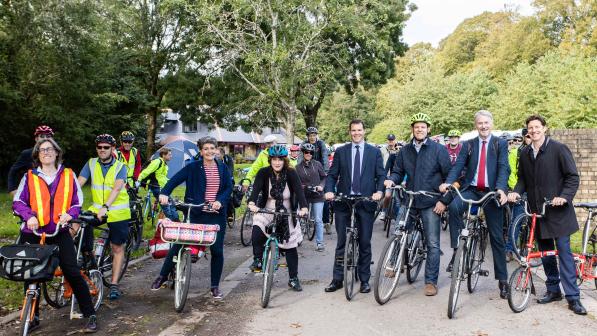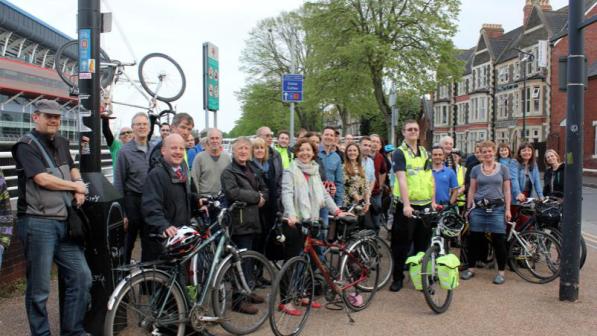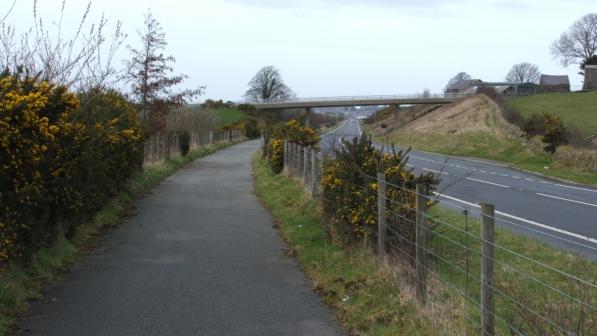Opinion: Huw Irranca-Davies on building a consensus for action on active travel

2023 saw a milestone for Wales’s ground-breaking Active Travel Act. October was its 10th anniversary.
The Senedd Cross-Party Group on the Active Travel Act – which I chair – organised an event to mark the occasion. We were ‘marking’ the 10 years, though, not having a straight-forward knees-up celebration.
Good things are happening because of the Active Travel Act. Recent significant increases in investment thanks to Lee Waters, the deputy minister for climate change, are making a real difference.
However, we have major concerns about the failures to deliver much of what the Act promised. The Cross-Party Group set out these failings in a major review of the functioning of the Act that we conducted in 2022. I wrote about changes we need to make for the Act to deliver on its promises for Cycling UK.
Despite those concerns, the Active Travel Act has been a landmark achievement for Wales. It set the framework for the increased investment we have recently seen in Wales.
Support for active travel
We wanted to hold an event to remind people of the importance of making a success of the Act and to demonstrate the breadth and depth of support for active travel in Wales. The organising committee was made up of walking and cycling groups, alongside organisations passionate about the environment (Friends of the Earth); health (Asthma + Lung UK); and equality (RNIB).
The event focused on the mechanics of active travel, as well as – importantly – the enormous benefits that getting people to switch from cars to walking and cycling offers our communities. Thus one of our keynote speakers was the director of health improvement for Public Health Wales.
It started with a bike ride to the Senedd, organised by Cycling UK and led by our special guest Chris Boardman, and a walk around the Senedd organised by Living Streets and the RNIB.

The riders and walkers congregated on the steps of the Senedd to be warmly welcomed in speeches by representatives of all four political parties: the leaders of Plaid Cymru and the Welsh Liberal Democrats; the Welsh Conservative’s shadow minister for climate change and the Labour deputy minister for climate change.
This broad alliance for active travel fed directly into the next milestone for the Act. One of the key failings in the Act that our review had identified was the lack of action on the duty to promote active travel.
The review blamed this on the constrained wording of the duty and the absence of a requirement to produce statutory guidance. It called for the Act to be amended and strengthened.
Getting laws changed is not easy. However, we saw an opportunity in the Welsh Government’s Environment (Air Quality and Soundscapes) (Wales) Bill, that was passing through the Senedd.
Carbon reduction
We have long been making the case that active travel is an excellent way to reduce harmful emissions. If people walk or cycle rather than drive, one of the biggest sources of pollution disappears.
The Welsh Government’s Clean Air Plan says: “Transport is now the largest source of NOx in Wales, predominantly due to emissions from road transport, accounting for approximately one third of emissions.”
We were able to utilise the support of our broad alliance to make the case for using the new bill to amend the Active Travel Act so that we would have a meaningful duty to promote active travel, backed up by statutory guidance.

The actions we want the amendment to make happen include fairly cheap and basic measures, such as signage specific to walkers and cyclists telling them the best route to key destinations and how long it will take them to get there. We need to inform people how to get to public services, to let them know how to travel actively and not just where the nearest car park is.
These are simple measures, but are they all too rare in our towns and cities. While the Welsh Government has made great strides in increasing investment in active travel infrastructure, there is often very little encouragement given to local people to use the new routes that have been constructed, or even signs telling them where the new paths go.
We need to ensure that infrastructure goes hand in hand with information. At a higher level, we want to ensure that the needs of active travellers are properly considered when the public sector in Wales issues guidance that influences how people travel.
This is important because, despite the Active Travel Act, there have been serious instances of guidance being produced that makes walking and cycling more difficult.
Small changes, real results
We need the Welsh public sector to make real efforts to influence how its 300,000 employees travel to work. Shifting the travel mode of even a small percentage of people will result in cleaner air, less congestion, lower carbon and a healthier workforce.
Our campaign for change was highly successful. We had the full support of Healthy Air Cymru, the health and environmental body lobbying for the bill.
As a member of the Senedd committee that scrutinised the Bill I was able to question all the organisations that gave evidence. I secured the agreement of each of them that promoting walking and cycling was effective in reducing pollution and that they wanted to see more action taken.

We received backing from all four parties in the Senedd, signifying unanimous political support for the importance of active travel as a means of improving air quality. On the back of this we were able to reach an agreement with the Welsh Government and our amendment has been included in the legislation.
By working in partnership, we have secured an important change to the legislation, a change that we are convinced will play a significant part in achieving the modal shift to walking and cycling that our environment and the health of our people need.
There is still work to do in ensuring that the new guidance is as strong as it needs to be. We look forward to continuing to work with Cycling UK and other partner organisations to ensure that our new amendment delivers.


